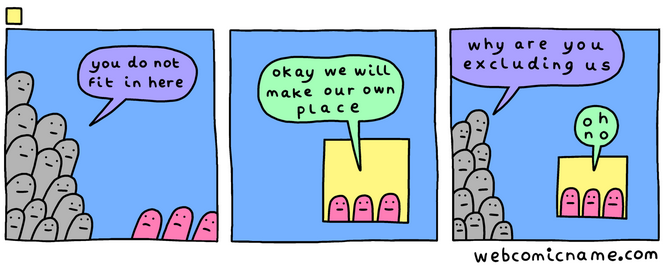they’re free to choose the narrative that makes sense to them, even if one narrative is being pushed much more heavily than the other.
This just translates to https://en.wikipedia.org/wiki/Regression_toward_the_mean or "reversion to mediocrity". Much like 🤬🤬🤬🤬it's /all, every time that mainstream spills into a community it ruins it and brings it closer to the mainstream.
In biology, you may recognize some of these phenomena from biochemistry: osmosis and diffusion. The demand to disable the "semi-permeable membrane" ends the purpose of the compartment.
Either the invading posts/comments get removed or the influx of participants (including voting) has to be rationed somehow. Doing neither is not a discussion about narratives, it's a mobbing. It's the opposite of promoting discourse, as that setup heavily favors the "mainstream" narrative, the status quo.
I should mention that I've been a moderator of internet communities since before Web 2.0 and I find the moderation tools for Lemmy type platforms to be terrible. If the expectation is to not have practical moderation, but instead to separate into fedi-islands and block the problematic networks, well, that would be a very blunt way to get to the same goals. Instead of having moderators individually ban users, you have admins ban entire networks of users.
There is no getting away from the need for moderators. Musk proved that again since he took over Twitter. Zuckerberg is proving it again now. You're not building a protopia by hampering moderation, you're building a cyber-wasteland. Any success with that will be temporary, like a pump and dump: you get a period of growth and a honeymoon, and then the critical mass of assholes is achieved and they turn everything to shit, and then most users have to start searching for greener ~~pastures~~ food forests to migrate to. Another term for that is unsustainable, it can't last.
The point of this is that you should be able to counter those comments with words, and not need moderation/admin tools to do so.
Rationality is much more complex than you think. The experience of the COVID-19 pandemic should've taught you that already, first hand. The simple model of persuasion by presenting reasonable arguments and evidence is wrong. There's an entire field looking into cognitive biases that show how irrational humans are. How exactly do you plan to argue with people who believe in "alternative facts" and "post-truth"?
All I see in the article you posted is a lack of experience in dealing with bullshit, a lack of understanding of the viral or memetic nature of bullshit.
It’s harder to just dismiss that comment if it’s interrupting your fictional story that’s pretending to be real. “The moon is upside down in Australia” does a whole lot more damage to the flat earth argument than “Nobody has crossed the ice wall” does to the truth. The purpose of allowing both of these is to help everyone get a little closer to reality and avoid incubating extreme cult-like behavior online.
It's disheartening that you haven't learned yet that flateartherism is a variant of creationism, another religiously inspired pseudoscience.
Since we're talking about Windows:
WinKey + .
to open up the secret emoji/symbols toolbox. 🫛
People who claim to hate violence need to learn about https://en.wikipedia.org/wiki/Structural_violence immediately
I don't get why it's hard to comprehend. By becoming (even) more conservative, more "R", they betrayed (even more of) their base. Why would timid Republicans want to vote for traitors pandering to them?
If you don't want to be hated, don't murder whales. It's very easy, literally most people do it.
The construction of the first Death Star 
Cross-sections of the DS-1 Death Star. 
https://starwars.fandom.com/wiki/DS-1_Death_Star_Mobile_Battle_Station
Plastering agricultural land with parking lots and suburban sprawl is a crime against humanity. This wasteful land use needs to end.
Thanks to social media, youth unemployment, an uptick in asylum seekers, ballooning energy prices and oodles of nationalist right-wing cash, Macron is no longer the only politician with the regal ability to play Jupiter on TV. There are now a record 4,005 candidates running in the first round, with many fabled divinities to choose from.
There's your problem. Defund the rich.
Gore won, but lost to a judicial coup.
veganpizza69
0 post score0 comment score

No